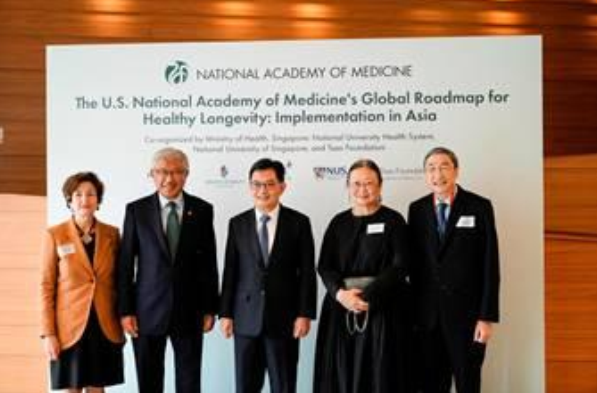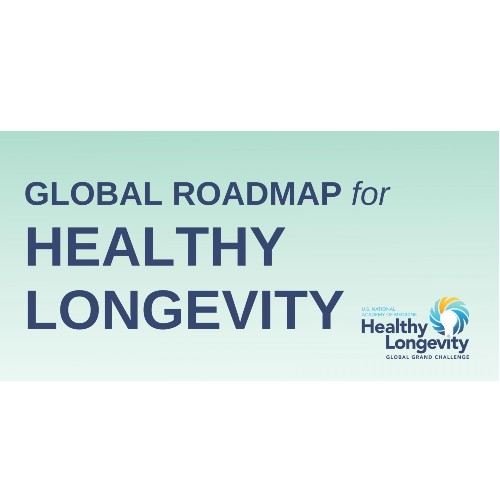Malaysia, 21st October 2022 – In its Global Risks Report, the World Economic Forum (WEF) highlights the most pressing threats to society each year. One of these threats is an ageing population. The population of people over age 65 has grown more quickly than other age groups due to longer life spans and declining birth rates. In the past, people could expect about three decades of good health as they age, but now people are living more years in poor health, putting a strain on society and healthcare systems worldwide. As the population of Southeast Asia ages, it will significantly impact the region's economic prospects.
To address this concern, the National Academy of Medicine U.S commissioned a group of global health experts this year to conduct key findings on why ageing societies matter globally and how best to maintain healthy longevity for all. The Global Roadmap for Healthy Longevity, a report by NAM is a call to action and offers strategies for all to thrive in 2050. The commission defines healthy longevity as the state in which years in good health approach the biological life span, with physical, cognitive, and social functioning – enabling wellbeing across populations.
The commission found substantial evidence to support a vision of healthy longevity in 2050. It identified four domains critical to achieving the vision: work, volunteering, and education; social infrastructure; physical environment; and public health, health systems, and long-term care.
The commission identified principles for achieving healthy longevity as:
- People of all ages, particularly older adults, reach their full potential to live life with good health, function, meaning, purpose, and dignity.
- Societies enable the best health and functioning that individuals at all ages are capable of attaining.
- Societies reduce disparities and enhance equity within and among countries to realize the wellbeing and contributions of all people, including those of older ages.
- The human, financial, and social capital of older people is realized for the benefit of all of society.
- Societies use data and meaningful metrics to track the achievement of outcomes and guide decision making.
Societies could thrive with strong social compact, intergenerational cohesion, and strong economies with plentiful work and volunteer roles for people of all ages. “By increasing healthy longevity, societies can tap into the opportunities offered by people as they live a full and robust life, being and doing what they value,” said Professor John Eu-Li Wong, Co-Chair, Commission for a Global Roadmap for Healthy Longevity, USA National Academy of Medicine, and Senior Vice President (Health Innovation & Translation), National University of Singapore.
Every country will have a different path to healthy longevity within its own context. No single approach will work globally. To initiate needed change, governments will need to establish calls to action to develop and implement data-driven all-of-society plans for building the organisations and social infrastructure needed to enable healthy longevity.
Lives of good health, function, meaning, purpose, and dignity are achievable – now is the time to begin working toward this better future for all.

The Global Roadmap for Healthy Longevity Report – Implementation in Asia Summit was held in Singapore on the 25th August 2022. This is the first NAM dissemination event since the release of the report in early June 2022.
Learn more about the report here: https://nam.edu/initiatives/grand-challenge-healthy-longevity/global-roadmap-for-healthy-longevity/.
About the National Academy of Medicine (NAM)
Founded in 1970 as the Institute of Medicine (IOM), the National Academy of Medicine (NAM) is one of three academies that make up the National Academies of Sciences, Engineering, and Medicine (the National Academies) in the United States. Operating under the 1863 Congressional charter of the National Academy of Sciences, the National Academies are private, nonprofit institutions that work outside of government to provide objective advice on matters of science, technology, and health. The NAM’s mission is to improve health for all by advancing science, accelerating health equity, and providing independent, authoritative, and trusted advice nationally and globally.
About the National University Health System (NUHS)
The National University Health System (NUHS) aims to transform how illness is prevented and managed by discovering causes of disease, development of more effective treatments through collaborative multidisciplinary research and clinical trials, and creation of better technologies and care delivery systems in partnership with others who share the same values and vision.
Institutions in the NUHS Group include the National University Hospital, Ng Teng Fong General Hospital, Jurong Community Hospital and Alexandra Hospital; three National Specialty Centres - National University Cancer Institute, Singapore (NCIS), National University Heart Centre, Singapore (NUHCS) and National University Centre for Oral Health, Singapore (NUCOHS); the National University Polyclinics (NUP); Jurong Medical Centre; and three NUS health sciences schools – NUS Yong Loo Lin School of Medicine (including the Alice Lee Centre for Nursing Studies), NUS Faculty of Dentistry and NUS Saw Swee Hock School of Public Health.
With member institutions under a common governance structure, NUHS creates synergies for the advancement of health by integrating patient care, health science education and biomedical research.
As a Regional Health System, NUHS works closely with health and social care partners across Singapore to develop and implement programmes that contribute to a healthy and engaged population in the Western part of Singapore.
For more information, please visit http://www.nuhs.edu.sg
About National University of Singapore (NUS)
The National University of Singapore (NUS) is Singapore’s flagship university, which offers a global approach to education, research and entrepreneurship, with a focus on Asian perspectives and expertise. We have 16 colleges, faculties and schools across three campuses in Singapore, with more than 40,000 students from 100 countries enriching our vibrant and diverse campus community. We have also established our NUS Overseas Colleges programme in more than 15 cities around the world.
Our multidisciplinary and real-world approach to education, research and entrepreneurship enables us to work closely with industry, governments and academia to address crucial and complex issues relevant to Asia and the world. Researchers in our faculties, 30 university-level research institutes, research centres of excellence and corporate labs focus on themes that include energy; environmental and urban sustainability; treatment and prevention of diseases; active ageing; advanced materials; risk management and resilience of financial systems; Asian studies; and Smart Nation capabilities such as artificial intelligence, data science, operations research and cybersecurity.
For more information on NUS, please visit www.nus.edu.sg.
About the Tsao Foundation
Tsao Foundation is dedicated to transforming the ageing experience so the extra decades of life in longevity is an opportunity for us to actualise our full potential for growth, wellbeing, and fulfilment in a society for all ages. Established in 1993 as a non-profit, operational foundation, the Tsao Foundation is an Institution of Public Character (IPC) with the goal of being a catalyst for constructive change at practice, systems and policy levels through innovations and excellence. Ageing-in-place and active ageing have been our battle cry since inception and our approaches are aligned with the UN’s Madrid International Plan of Action on Ageing (MIPAA) and WHO’s active ageing frameworks. For almost three decades, Tsao Foundation has pioneered new approaches, services and programmes in ageing, longevity, and community-based eldercare across a range of disciplines, with the aim of creating a better future where ageing is not a burden, but longevity is an opportunity for all to live long, full lives.
The Foundation's work is taken forward through four synergistic initiatives:
Hua Mei Centre for Successful Ageing pioneers health and psycho-social care services to mature adults living in the community through a person-centred, team-managed approach.
Hua Mei Training Academy is Singapore’s first dedicated training provider in community-based eldercare, offering professional and entry-level certificate courses and consultancy as well as learning programs for the community in longevity preparation.
International Longevity Centre Singapore implements ground-breaking community development programmes, policy relevant research, and stakeholder collaborations to join dots between community, academia, enterprise and public policy for innovative and effective approaches to ageing and longevity.
The Community for Successful Ageing (ComSA) at Whampoa is a living lab that takes a population heath, partnership oriented, community-wide approach to successful ageing through forging an integrated health and social care system to promote health and well-being over the life course and enable ageing in place.
For more information, please visit www.tsaofoundation.org.
-end-
For media enquiries, please contact:
Benjamin Singh
Public Relations Consultant
Swordraf Strategies
M: +6011-10794567
E:[email protected]

